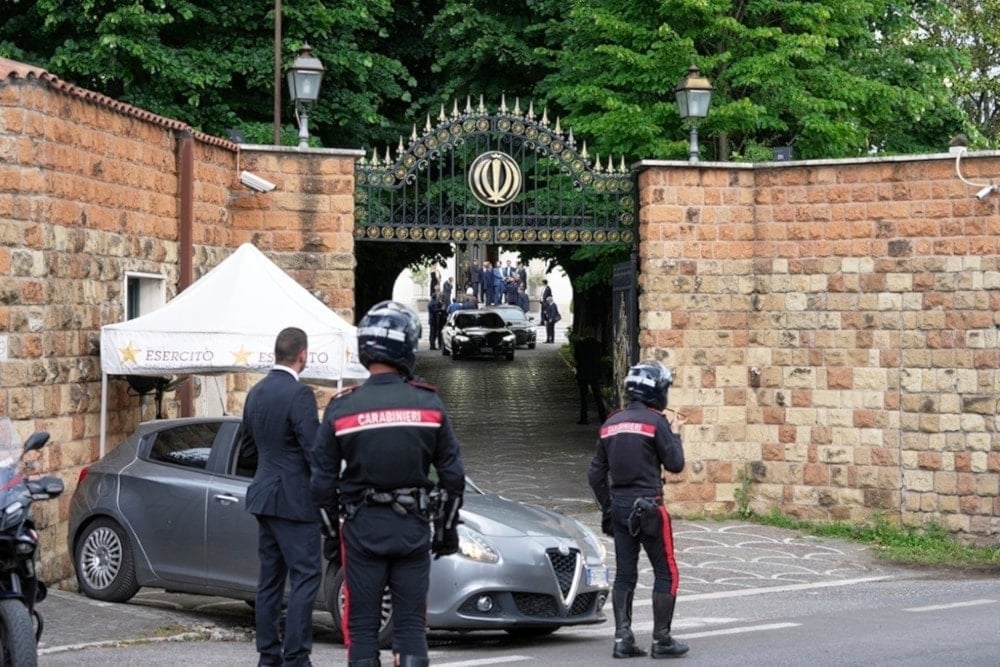Deal or sanctions: West threaten Iran ahead of August deadline
As Western powers push snapback sanctions, Iran defends its rights under international law and signals it won’t yield to coercive diplomacy.
-

Iranian delegates leave the Iranian Embassy in Rome after a closed-door meeting at the Omani Embassy with a US delegation to discuss Tehran’s nuclear program, Friday, May 23, 2025 (AP)
US Secretary of State Marco Rubio, along with the foreign ministers of France, Germany, and the United Kingdom, has agreed to set an end-of-August deadline for reaching a new nuclear agreement with Iran.
The decision, discussed during a joint call on Monday, could trigger a full reimposition of United Nations sanctions if no deal is reached, Axios reported, citing three sources familiar with the matter.
If Iran fails to meet the so-called "deadline," the European trio plans to activate the “snapback” mechanism, an automatic reinstatement of all UN Security Council sanctions that were lifted under the 2015 nuclear agreement. The mechanism is intended to respond to 'Iranian noncompliance' and is set to expire in October.
The move is time-sensitive. The snapback process takes 30 days to complete, and European diplomats are keen to initiate it before Russia assumes the rotating presidency of the UN Security Council this October. Western officials see the snapback as both a diplomatic pressure tool and a contingency plan if ongoing negotiations collapse, as per the report.
Iran, however, maintains there is no legal basis for the snapback and has warned that triggering it could prompt Tehran to withdraw from the Nuclear Non-Proliferation Treaty altogether.
Iranian President Masoud Pezeshkian reiterated on Tuesday his administration’s continued commitment to a peaceful resolution and diplomatic engagement. In a post published Monday night on X, Pezeshkian stated: “To open new horizons, we must take a critical look at the past. What will lead us toward a better future is rebuilding hope, being ready to learn and change, and forging a new path through consensus, empathy, and rational thinking.”
Diplomatic coordination behind closed doors
Sources say Monday’s call was reportedly aimed at aligning the allied strategy on both the timing and messaging of the snapback option.
Two sources indicated to Axios that European officials will reengage with Tehran in the coming weeks to make clear that sanctions can still be avoided, provided Iran takes "verifiable steps to allay international concerns over its nuclear program."
One key demand is that Iran resume cooperation with the International Atomic Energy Agency (IAEA), including inspections that were halted following joint US-Israeli attacks on Iranian nuclear facilities.
Another discussed possible step would be removing around 400 kilograms of uranium enriched to 60% purity.
Post-war diplomacy and Israeli pressure
The push for a snapback comes in the aftermath of the recent Israeli aggression on Iranian territories, which has shifted diplomatic dynamics. While some European and Israeli officials initially feared that the Trump administration might avoid escalating tensions to preserve the possibility of negotiations, that view appears to have changed.
During Israeli Prime Minister Benjamin Netanyahu’s recent visit to the White House, he reportedly urged President Trump, Secretary Rubio, and White House envoy Steve Witkoff not to obstruct the snapback effort. Two Israeli officials confirmed Netanyahu told Witkoff that Washington must send a clear message to Tehran that time is running out. “We felt that Trump and his team agreed with us,” one official said.
US stance hardens
A senior US official confirmed that the administration now backs the snapback approach and sees it as critical leverage in ongoing diplomatic efforts. The official added that President Trump is “highly frustrated” by Tehran’s continued absence from negotiations.
White House envoy Steve Witkoff, who has been managing US-Iran policy under Trump, is said to have made clear that future talks must occur directly with Iranian representatives, not through third-party mediation. According to the official, this is intended to "avoid misunderstandings and expedite the process.”
An eroded trust
Recent statements by Iranian officials reinforce Iran’s openness to diplomacy, while expressing deep mistrust toward both the US and "Israel" following the latest war.
Foreign Minister Abbas Araghchi accused "Israel" of deliberately sabotaging promising talks, stating that just 48 hours before the June 13 attack, Tehran and Washington were “on the cusp of a historic breakthrough.” Araghchi added that five meetings with US officials had yielded more than “years of prior negotiations,” but emphasized Iran will not accept terms that amount to surrender.
Iranian officials across the board have underlined key conditions for any diplomatic process: formal US guarantees against military action, acknowledgment of past policy failures, and non-negotiable red lines such as Iran’s missile capabilities and peaceful nuclear rights.

 5 Min Read
5 Min Read










